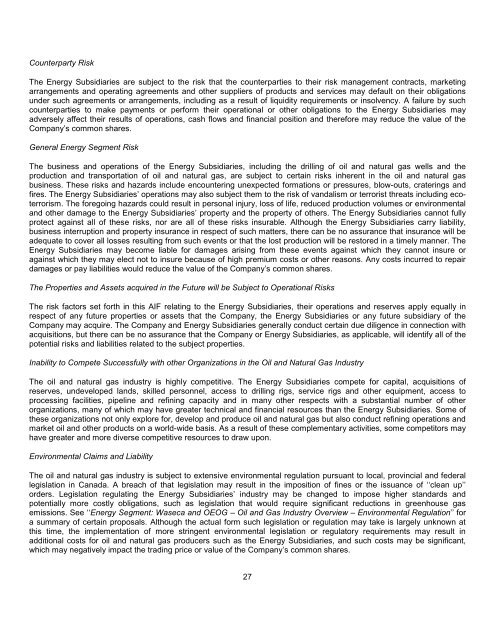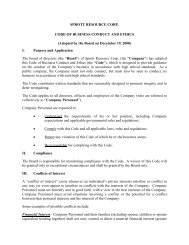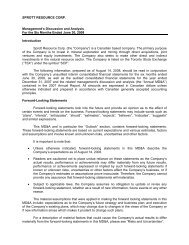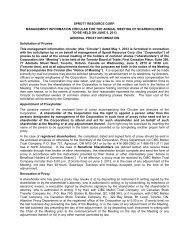AIF - Sprott Resource Corp.
AIF - Sprott Resource Corp.
AIF - Sprott Resource Corp.
You also want an ePaper? Increase the reach of your titles
YUMPU automatically turns print PDFs into web optimized ePapers that Google loves.
Counterparty Risk<br />
The Energy Subsidiaries are subject to the risk that the counterparties to their risk management contracts, marketing<br />
arrangements and operating agreements and other suppliers of products and services may default on their obligations<br />
under such agreements or arrangements, including as a result of liquidity requirements or insolvency. A failure by such<br />
counterparties to make payments or perform their operational or other obligations to the Energy Subsidiaries may<br />
adversely affect their results of operations, cash flows and financial position and therefore may reduce the value of the<br />
Company’s common shares.<br />
General Energy Segment Risk<br />
The business and operations of the Energy Subsidiaries, including the drilling of oil and natural gas wells and the<br />
production and transportation of oil and natural gas, are subject to certain risks inherent in the oil and natural gas<br />
business. These risks and hazards include encountering unexpected formations or pressures, blow-outs, craterings and<br />
fires. The Energy Subsidiaries’ operations may also subject them to the risk of vandalism or terrorist threats including ecoterrorism.<br />
The foregoing hazards could result in personal injury, loss of life, reduced production volumes or environmental<br />
and other damage to the Energy Subsidiaries’ property and the property of others. The Energy Subsidiaries cannot fully<br />
protect against all of these risks, nor are all of these risks insurable. Although the Energy Subsidiaries carry liability,<br />
business interruption and property insurance in respect of such matters, there can be no assurance that insurance will be<br />
adequate to cover all losses resulting from such events or that the lost production will be restored in a timely manner. The<br />
Energy Subsidiaries may become liable for damages arising from these events against which they cannot insure or<br />
against which they may elect not to insure because of high premium costs or other reasons. Any costs incurred to repair<br />
damages or pay liabilities would reduce the value of the Company’s common shares.<br />
The Properties and Assets acquired in the Future will be Subject to Operational Risks<br />
The risk factors set forth in this <strong>AIF</strong> relating to the Energy Subsidiaries, their operations and reserves apply equally in<br />
respect of any future properties or assets that the Company, the Energy Subsidiaries or any future subsidiary of the<br />
Company may acquire. The Company and Energy Subsidiaries generally conduct certain due diligence in connection with<br />
acquisitions, but there can be no assurance that the Company or Energy Subsidiaries, as applicable, will identify all of the<br />
potential risks and liabilities related to the subject properties.<br />
Inability to Compete Successfully with other Organizations in the Oil and Natural Gas Industry<br />
The oil and natural gas industry is highly competitive. The Energy Subsidiaries compete for capital, acquisitions of<br />
reserves, undeveloped lands, skilled personnel, access to drilling rigs, service rigs and other equipment, access to<br />
processing facilities, pipeline and refining capacity and in many other respects with a substantial number of other<br />
organizations, many of which may have greater technical and financial resources than the Energy Subsidiaries. Some of<br />
these organizations not only explore for, develop and produce oil and natural gas but also conduct refining operations and<br />
market oil and other products on a world-wide basis. As a result of these complementary activities, some competitors may<br />
have greater and more diverse competitive resources to draw upon.<br />
Environmental Claims and Liability<br />
The oil and natural gas industry is subject to extensive environmental regulation pursuant to local, provincial and federal<br />
legislation in Canada. A breach of that legislation may result in the imposition of fines or the issuance of ‘‘clean up’’<br />
orders. Legislation regulating the Energy Subsidiaries’ industry may be changed to impose higher standards and<br />
potentially more costly obligations, such as legislation that would require significant reductions in greenhouse gas<br />
emissions. See ‘‘Energy Segment: Waseca and OEOG – Oil and Gas Industry Overview – Environmental Regulation’’ for<br />
a summary of certain proposals. Although the actual form such legislation or regulation may take is largely unknown at<br />
this time, the implementation of more stringent environmental legislation or regulatory requirements may result in<br />
additional costs for oil and natural gas producers such as the Energy Subsidiaries, and such costs may be significant,<br />
which may negatively impact the trading price or value of the Company’s common shares.<br />
27





